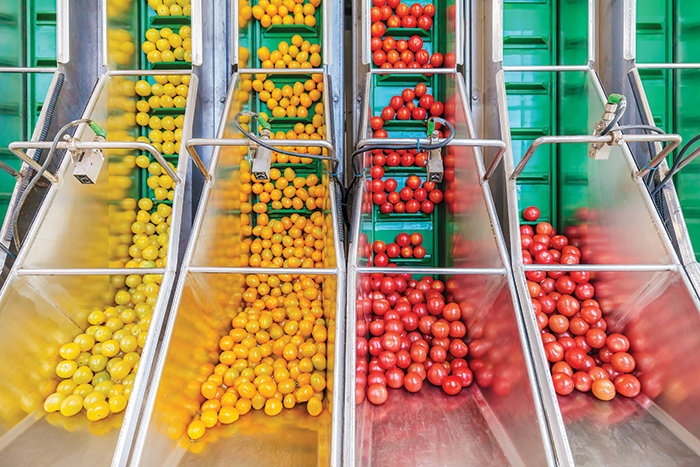Consumers Seeking Healthier Snacks, Plant Extracts Can Inhibit Toxic Substances
OMNIVORE
MARKET TRENDS
Consumers seek healthier snacks
Changing attitudes about health and the need for escape from the pressures of daily life have led to an increase in consumer snacking, according to a recent webinar from Innova Market Insights.
According to Innova’s Consumer Trends 2023 Report—Balancing Priorities, 10% of consumers surveyed stated that the desire to “feel well” has driven them to seek a healthier lifestyle, and 61% stated healthier living means following a healthy, nutritional diet. Additionally, Innova noted the trend toward positive eating, or consuming foods that have a positive impact on health. Innova identified three key opportunities for innovation in the snack category: nutrient-rich treats, digital connections among consumers, and joyful pleasures.
Consumers engaged with snacking for better nutrition tend to have a higher income and be active, according to Innova research. Nearly one-third (32%) of consumers aged 18 to 24 reported choosing products that positively boost their nutrition or how their body functions. These consumers are also seeking snacks with indulgent ingredients, such as chocolate or fruits.
Following the COVID-19 pandemic, consumers are spending more time online, which presents an opportunity for snacking. Innova’s data states that nearly one in four consumers aged 18 to 34 said they socialize through gaming, and one in three said they socialize through social media. Further, 30% of consumers surveyed are curious about engaging with a digital food promotion, such as that on a metaverse or gaming platform. Snacks intended for streamers and gamers have functional benefits that can enhance gaming performance or are easier to eat while gaming.
According to Innova’s Snacking & Healthy Snacking Survey 2023, three in five consumers reported that snacking boosts their emotional well-being, and 30% reported that stress is a trigger for their snacking. Fresh ingredients are the leading driver for pleasure within snacks, so snacks with literal or perceptual freshness are more desirable.
RESEARCH
Plant extracts can inhibit toxic substances, review shows
Plant extracts can be used in fried foods to inhibit the formation of toxic substances, according to a new review in Comprehensive Reviews in Food Science and Food Safety.
The review, authored by researchers from Jiangnan University, University of Massachusetts, Amherst, and South China Agricultural University, describes the types of unwanted substances that can form when a food is fried, and how plant extracts can be used to avoid this formation.
Frying causes heat and mass transfer processes between a heated edible oil and a food. During this process, the food loses water, absorbs oil, and undergoes a series of physical and chemical changes. If the process is not properly controlled, harmful substances can form, including acrylamide, heterocyclic amines, trans fatty acids, advanced glycation end products, hydroxymethyl furfural, and polycyclic aromatic hydrocarbons.
Plants contain a variety of bioactive substances, including flavonoids, catechins, polyphenols, and anthocyanins. Once extracted, these substances can be used to create functional ingredients, such as tannins and phenolic acid compounds, which are associated with beneficial health effects. The researchers outline several studies where foods have been coated in plant extract prior to frying and the formation of the hazardous substances was inhibited.
The review also discusses some of the research done on the sensory quality of foods treated with plant extracts. Many of the extracts, such as green tea extract, apple peel extract, and rosemary extract, have their own inherent flavor that could affect the overall taste, the researchers note. They also point out that the texture and color of the food are not significantly affected by the presence of extracts.
Further research is needed on the combinations of plant extracts for the optimal result, according to the authors, as well as the sensory effects of these extracts.
COMMUNITY
IFT announces new leadership
The IFT Board of Directors is composed of a dedicated group of leaders who generously contribute their time and expertise to further the advancement of IFT’s members, the profession, and the science of food.
Congratulations to the following individuals, who have been elected as IFT leaders and will take office on Sept. 1, 2023: President-Elect Chris Daubert, Vice Chancellor and Dean, College of Agriculture, Food and Natural Resources, University of Missouri, Columbia, Mo.; Board members Nancy Moriarity, retired, PepsiCo; Jaime Reeves, Executive Vice President, Product Development and Commercialization, Mattson, Foster City, Calif.; Jamie Valenti-Jordan, CEO, Catapult Commercialization Services, Milwaukee; and Jeffrey Varcoe, Vice President, Food Safety and Quality, The Schwan Food Company, Marshall, Minn.
Recognizing IFT’s 50-year members
The following individuals are celebrating their 50th anniversary as members of IFT: A. Elizabeth Sloan, Ahmed Abdalla, Alden Booren, Andrew Ebert, Anjan Reddy, Anna Resurreccion, Anton Angelich, Bhupen Randeria, Camilo Rozo, Darrel Herbst, David Wengerhoff, Earl Weak, Felix Escher, Francis Tangel, Frank Conforti, Frederick Payne, Fredric Caporaso, Gerald Popenhagen, Hamsa Thota, Howard Moskowitz, J. Roy Escoubas, Jack Ridge, James Morano, James Coughlin, K.D. Tripathi, Kathleen Feicht, Kenneth McMillin, Kevin O’Rell, Mamoun Hussein, Marvin Rudolph, Michael Blumenthal, Mona Wolf, Noel Anderson, P. Michael Davidson, Pamela Tom, Purnendu Vasavada, R. Paul Singh, R.B. Tompkin, Rajen Mehta, Rena Pierami, Richard Barndt, Richard Lingelbach, Robert Buchanan, Robert Raynor, Ronald Jackson, Steven Ostrom, William Schwartz, Zara Raneses, and Zata Vickers.
Noel Anderson, past president of IFT, said that his membership was inspired by his father.
“My initial participation was ignited by my father who, like me, was an active IFT member and an IFT Fellow,” he said. “Over time, I learned that the more active my participation, the more I benefited from my membership. IFT has been a tremendous source of continuous learning and support. When I meet other members of IFT, I know we have so much in common and so much we can share.”
Felix Escher, professor emeritus at the Swiss Federal Institute of Technology in Zurich, says that he attended his first annual meeting in Minneapolis in 1972, which had an impact on his budding career.
“Later in my academic career, participation in IFT activities was an important part of international relations in food science and technology,” he explained. “Over the years, I met with quite a number of IFT presidents, and some of these fine personalities became personal friends.”
Escher was a professor of food technology at the Institute of Food Science and Nutrition at ETH Zurich from 1991 to 2007.
“IFT membership keeps me in touch with people, ideas, and information related to all my interests in food,” says Zata Vickers, professor and director of undergraduate studies in food science at the University of Minnesota.
In Memoriam
IFT notes the passing of Norman Potter.
INDUSTRY
Companies rely more on co-manufacturers and automation tools
Workers in the food and beverage industry favor automation tools and digital transformation (cited by 53%) over increased employee headcount and supplier diversity (noted by 47%) to improve their jobs, according to the TraceGains 2023 Food and Beverage Industry Report.
TraceGains, an online network and ingredients marketplace, surveyed nearly 300 professionals in the food and beverage industry on the adaptability of the field over the past few years. The survey included questions on how operations changed since the onset of the COVID-19 pandemic and how to improve handling of daily tasks.
Tedious paperwork, compliance regulations, and sourcing complications, are the top three day-to-day work challenges food and beverage professionals identified. Nearly nine out of 10 survey respondents responsible for food production and supply chain management (86%) reported feeling overworked at least to some extent, with 16% describing themselves as “completely” overworked.
In this environment, three-quarters of survey respondents reported relying on contract manufacturing to operate more efficiently and with a renewed focus on product development. More than half (55%) said they are using more co-manufacturers now than they did three years ago. Survey respondents said they turn to co-manufacturers to produce finished goods (75%), manufacture component materials (36%), and source and manage materials (20%). Benefits of co-manufacturing respondents pointed to include getting products to market faster, reducing facilities and equipment costs, and avoiding labor shortages.










